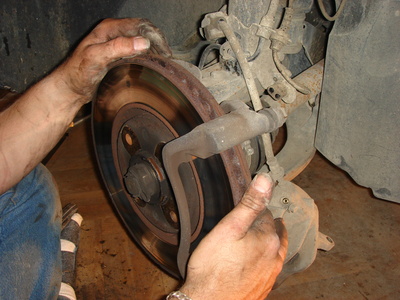
Replacing brake pads and bleeding of brakes are both normal parts of routine brake maintenance, but they are not necessarily connected one to the other. Changing the brake pads does not necessarily require a brake bleeding.
Bleeding the brakes is done to remove any air trapped in the brake lines. It should also be done regularly in order to remove any contaminated brake fluid or solid contamination from the brake hydraulic system.
Brake pads routinely wear out and must be replaced. A routine pad replacement does not create a situation where air or contamination could be introduced to the brake hydraulic system, so bleeding of the brakes is not normally required. Regardless, it is a good idea to have the brakes bled when the pads are changed simply because it is easier to do this when the brake parts are already exposed.
Sometimes during a brake pad change, there can be a problem retracting the brake piston or a problem with the flexible brake lines. Under these conditions, there is a chance that air or contamination enter the brake fluid, and the brakes should be bled as a precaution.